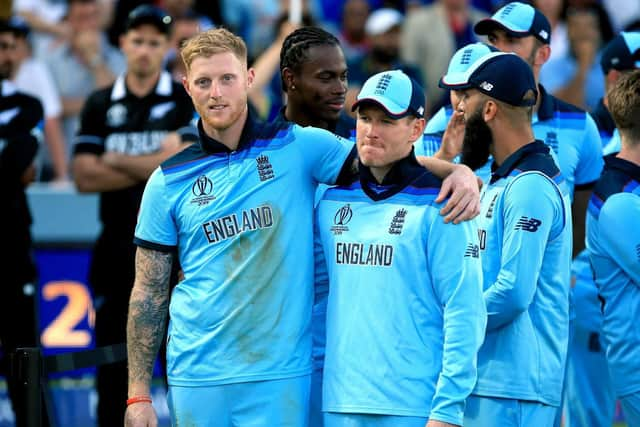How many heroes like Ben Stokes did English cricket lose when sport wasn't on free-to-air TV, asks MP
Labour's Ian Lucas challenged officials from the England and Wales Cricket Board as he told a Commons Select Committee that monthly participation rates fell from 403,000 to 279,000 2011 to 2016.
Members of the Digital, Culture, Media and Sport Committee are examining how English cricket can capitalise on the men's team's World Cup success this year by growing the sport's appeal and bringing it to a wider audience.
Advertisement
Hide AdAdvertisement
Hide AdAnd flanked by the Men and Women's World Cup trophies, both currently held by England, ECB chief executive officer Tom Harrison was quizzed over how the sport would avoid repeating what happened after England's famous Ashes triumph of 2005.


Committee chairman Damian Collins said that rather than prompting a renaissance in the game, the following years actually saw a decline in attendances, something blamed by many on the switch from free-to-air to pay television.
Mr Harrison said the game in 2005 was very different and investment was needed to bring stadia up to scratch, but that the decline was a "more complex issue". He said that in 2005, 40 per cent of people only had five channels on their TVs and there were no iPads.
He told MPs: "We are dealing with enormous lifestyle changes, we are seeing the kind of figures other sports are facing in terms of challenges around participation. We are better placed than we have ever been to address those changes through the plan we have built."
Advertisement
Hide AdAdvertisement
Hide AdHe added that between 2020 and 2024 he expected the game to be 75 per cent reliant on pay television such as Sky for revenues, allowing it to invest in the grass roots of the game.
Mr Lucas said: "I am delighted you are sitting there with the trophies either side of you. You present a very sunny picture but I am really concerned that participation figures are as they are. I think that is a lot to do with the fact that we do not have free-to-air coverage on our screens."
Asked what the ECB would do differently, he said it had signed up to a voluntary code which meant 30 per cent of revenues would go to grass root causes, and that the sport was going back onto the BBC with live cricket next year. He said the product would drive audiences for the betterment of all of cricket.
Mr Lucas asked about the possibility of having just one Test match on free-to-air television, adding that the impact of the Rugby World Cup was increased by being on ITV.
Advertisement
Hide AdAdvertisement
Hide AdBut Mr Harrison said an earlier review showed that having one Test match a year between 2014 and 2017 on free-to-air TV would cost the game £137.4m, 48 per cent of the budget for domestic broadcast rights.
He said that missing out on the extra money from a pay TV operator would impact on its strategic plan to grow cricket and was "extremely hard to justify".
Mr Lucas replied that the fall in participation rates between 2011 and 2016 was also "extremely hard to justify" and asked: "I wonder how many Ben Stokes we lost in that period."
MPs were told about the growth in the women's game in recent years, a trend helped by England's win in the 2017 World Cup.
Advertisement
Hide AdAdvertisement
Hide AdYorkshire peer Lord Patel of Bradford, a Senior Independent Non-Executive Director at the ECB, said 2,000 South Asian women over four years were being helped to become mentors and cricket coaches.
He said: "One example of that is three months ago at Bradford Park Avenue, and I've never seen it in my life and I've lived there all my life, they had 600 people watching 44 women, England, Pakistan, Bangladesh, Sri Lanka playing.
"Women from A&E doctors to solicitors to students to unemployed people, it was an amazing sight, it did something we never thought we'd do."
